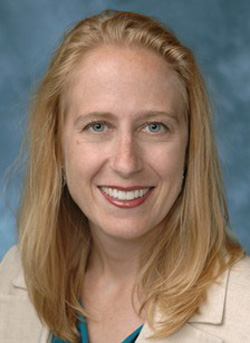
Growing up in a bilingual household, living and working abroad as an adult, and knowing from personal experience the high risk of depression in Latino girls, Rebecca Ford-Paz, PhD, assistant professor in psychiatry and behavioral sciences, has dedicated her career to providing therapy to Latino youth and working to diminish mental health disparities.
As a member of the Alliance for Research in Chicagoland Communities (ARCC) Steering Committee, Ford-Paz presented at a community meeting in Logan Square on September 5 about the need for youth mental health services in the Latino community.
She finds mental health disparity issues important because she sees the effects of limited community resources in her clinical practice.
“I work with depressed teens every day. With mental health clinics closing, it creates less access and resources, and I find it heartbreaking to see kids who have treatable issues go untreated,” she said.
What inspired you to get involved in Logan Square?
I have always had a little bit of a community activist in me. When mental health clinics close, the impact reverberates through the mental health care system. We have kids waiting an enormous time for services, and parents are also in need of treatment. Also, as a clinician, my job isn’t only to treat patients as individuals, but to strive to make an impact on the community as a whole. I need to do what I can to make a difference in policy. I think we need more community mental health clinics, not fewer.
What are your research interests?
I have had a long-standing clinical and research interest in the reduction of mental health disparities for Latino youth and families. Right now my research focuses on community-engaged prevention research to develop culturally-tailored interventions for Latino youth
What projects are you working on?
The projects I am working on are all community-based participatory research, which means community members are involved in every aspect of the research from designing the projects to data collection to disseminating results.
We have three community partners – Healthcare Alternative Systems, Alternatives, Inc., and Alivio Medical Center – engaged with our research project to target the prevention of depression in Latino youth.
We ran two focus groups, one with adults and one with adolescents. We wanted to learn why Latino populations have a higher rate of depression and suicide, and what needs to be in effect to make a change in the community. Those focus groups informed us and enabled us to run a pilot program. We built a curriculum and training for a program to develop thought leaders in the Latino community in Pilsen. The program consisted of an intervention, a tour of Ann & Robert H. Lurie Children’s Hospital of Chicago, and three months of follow-up phone, email, and text support.
Another part of their training consisted of three hour sessions in which they learned about the symptoms of depression, myths and stigmas about depression, the prevalence of depression in Latino populations, and the interplay of culture and health seeking behaviors. Then the trainees were asked how they would raise awareness and asked to come up with outreach programs in their communities.
What motivates you?
I have people who I work with locally and nationally who have been encouraging. John Lavigne, PhD, professor in psychiatry and behavioral sciences and pediatrics, has been a great mentor in fostering my career, and I think all the staff at ARCC has been an invaluable source of technical and moral support.
Aida Luz Giachello, PhD, research professor in preventive medicine, has been a big inspiration for me because she is a prolific researcher, versed in CBPR and health disparities in the Latino community.
What is next?
I am currently writing a K award grant that would give me protected time to continue my research and apply for larger grants. My biggest struggle is finding the time to do the research since I am a full-time clinician. I think it is important that Northwestern is taking more interest in community engaged research and such collaboration creates a positive image of the university in the community.






